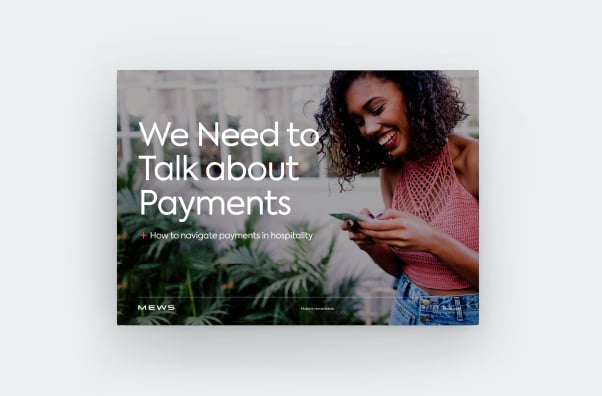Table of contents
How many payment methods do you accept at your hotel? Do you know your 3DS from your NFC? If these questions leave you scratching your head, it’s okay. The payments landscape in hospitality is changing more rapidly than ever, and the longer you wait to embrace new habits and technology, the more you risk being left behind.
We Need to Talk About Payments is our guide to navigating this world and putting your property in the best position to reap the rich rewards of a more connected, automated payments ecosystem. Do things right and you can expect huge time savings, boosted revenue, and happier guests. Read on for more details, or go ahead and hit that big button below.
What’s in your guide to hospitality payments?
We Need to Talk About Payments is a combination of essential payment and industry context, combined with actionable tips that will help you move into a more dynamic payments mindset. Here’s what’s inside.
An overview of the payments landscape
We look to the past (and for some, the present) to see how payment processes, security, and attitudes have changed. Then, we turn to the future (for some, the present) and get up to speed about the latest in hospitality payments and how they benefit both hotels and guests.
The five benefits of payment automation
We’ve covered the context, so let’s get into the specifics. Walk through the five key benefits to payment automation, with data and real customer stories to demonstrate what you could achieve. The five benefits are:
- Improve operations
- Be more efficient
- Increase revenue opportunities
- Heighten security
- Make guests happy
A look inside Mews Payments
If you didn’t know already, you’ve probably guessed by now that Mews has an amazing payments solution of our own: it’s called Mews Payments. Take a quick tour to see how adopting a modern payments solution could transform your property for both your team and your guests.
Who should read this report?
Our guide to understanding hospitality payments is essential reading for any hotelier – and yes, we would say that. If your team is wasting time and effort on clunky manual processes like taking card readings for every payment, you’ll be happy to find that a happier future is possible. Even if you think you’re already ahead of the curve, there may be areas or tips that you hadn’t yet considered.
Front of House Managers will particularly benefit – as will receptionists – from adopting a modern payment solution, as they’ll have much more time to engage with guests meaningfully instead of asking them how they'd like to pay and handing over terminals. It’s also good news for Revenue Managers and Accountants, and ultimately anyone on your team who cares about guest happiness.
Read an extract
Maybe you’re someone who likes to try before they buy. No problem. (Also, there’s no buying required, the guide is totally free.) Here’s an extract that you can sink your teeth into.
Increase revenue opportunities
Automated payments can have a positive influence on your bottom line. As mobile payments in particular continue to increase, you should be rubbing your hands with glee: those who use mobile payments spend on average twice as much as those who don’t. Buying goods and services without the need to enter your card details or hand over cash is a different mindset, and one that you should take advantage of.
It’s also an opportunity to make the most of upselling and cross selling your other services and amenities. A smart hospitality cloud will be able to connect your ancillary services like restaurants and spas and put everything on the same bill. Whether you charge immediately or at the end of the stay is immaterial; either way, you’ll already have the guest’s card details and you’ll be able to process the transaction with just a click.
If you want ideas for how to be more aggressive with generating ancillary revenues, look no further than the airline industry. They’re experts at upselling, whether it's seat allocation and baggage with budget carriers, or sky lounges and first-class upgrades with premium airlines. For the most part, these add-ons are bought during booking, so make sure you have a booking engine that can handle lots of extras.
There’s a lot of interesting reading around the neuroscience of making purchases. An MIT study found that paying with a credit card creates ‘purchase cravings’ in your brain for more spending, and that new, alternative payment methods could have an even stronger effect.
And then there’s the L word: loyalty. Loyalty programs are an opportunity for hoteliers to encourage better engagement and precious return business. 69% of people are more likely to use a loyalty card if it’s on their phone, so building loyalty programs into the mobile payment platform could well be the future.
It’s not all about boosting profits, either. Payment automation can also help minimize losses. Payment details are taken at the point of booking (even if the guest isn’t charged yet) which means that incorrect card details are immediately flagged. This reduces no shows and gives you more time to resell rooms if the payment details don’t check out. If your guest doesn’t turn up on the day, you already have their card details so you can automatically take your cancellation or no-show fee. No shows typically equate to 1% of revenue, so revenue protection here can make a big difference.

2026 Hospitality Industry Outlook
Download now
Table of contents
Hospitality hot takes straight to your inbox




.webp)
